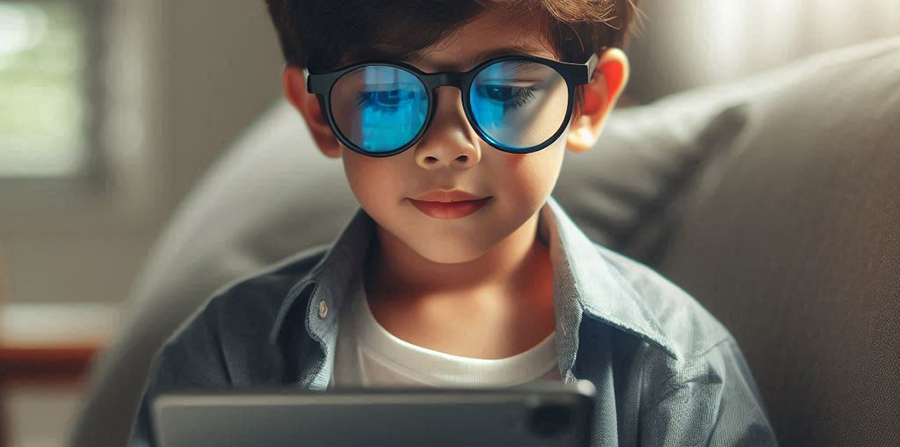
In today’s digital age, children are spending more time than ever in front of screens—whether for school, gaming, or staying connected. Understandably, many parents worry about how all this screen time affects their child’s eyes. One of the most talked-about solutions? Blue light-blocking lenses. But are they really necessary—and could they be doing more harm than good?
Let’s unpack the facts.
Blue light is a type of high-energy visible (HEV) light with wavelengths between 380–500 nanometres. It’s naturally present in sunlight, but also emitted by digital devices, LED lighting, and screens.
While concerns have grown alongside screen use, it’s important to separate myths from science when it comes to how blue light affects the eyes.
Short answer: not really.
Digital eye strain (also known as computer vision syndrome) causes symptoms like eye fatigue, dryness, blurred vision, and headaches. Many assume blue light is the culprit, but according to the American Academy of Ophthalmology (AAO), the main causes are prolonged screen time, reduced blinking, and glare—not blue light itself.
Rather than relying solely on blue light lenses, a simple strategy like the 20-20-20 rule is more effective: every 20 minutes, look at something 20 feet away for at least 20 seconds.
Here’s where blue light-blocking glasses may shine.
Exposure to blue light in the evening can suppress melatonin, the hormone that regulates sleep. This is especially important for teens, who are already prone to later sleep cycles. Studies suggest that blue light filters or glasses worn in the evening can improve sleep quality.
Tip: Set devices to night mode or limit screen time 1–2 hours before bed to support healthier sleep patterns.
This is a big question for many parents.
Myopia is on the rise in children, and factors like prolonged near work and less time outdoors are strongly linked. While some early studies in animals suggest that blue light might play a role in preventing myopia progression, current human research doesn’t support this. In fact, one 12-month study found no significant benefit of blue light-blocking lenses in slowing myopia in children.
In other words, blue light may not be the villain here. Myopia control strategies—like outdoor play and specialized lenses—are far more effective.
If you’re unsure how to best support your child’s visual development, here are a few science-backed tips:
Blue light-blocking lenses aren’t harmful, and they may help with sleep, but they’re not the magic fix for digital eye strain or myopia. The real key? A well-rounded approach that includes healthy screen habits, more outdoor time, and early detection of vision changes.
Book a consultation with an optometrist who specializes in myopia management. Every child’s eyes are different—let’s create a plan that supports their long-term visual health and academic success
Fill in the form below and we will get back to you as soon as we can.
Address: Shop 29 Crowthorne Shopping Centre, Cnr Main & Arthur Roads, Kyalami, Midrand